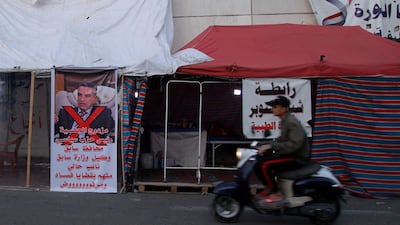Iraq’s prime minister-designate on Sunday sought to shed his pro-US reputation as power centres supported by Iran blocked his path to forming a government.
With a deadline on April 15, 1s short of crucial support from blocs regarded as clients of Iran, politicians who support him told The National.
Mr Al Zurfi called for the lifting of US sanctions on the Iranian government, without naming Washington, to assist Tehran in its fight against coronavirus.
He said in a tweet that world powers must “lift or lessen the sanctions and provide medical treatments”, predicting there would be benefits to Iraq as the country most connected with Iran.
Mr Al Zurfi, a member of the former opposition to Saddam Hussein, lived in exile in the US.
The American military removed Saddam in 2003 and brought in Mr Al Zurfi and other Iraqi political exiles to run the country.
He was twice governor of Najaf before becoming an intelligence operative, then a parliamentarian.
A presidential decree on March 16 appointed Mr Al Zurfi to form a government in 30 days to replace caretaker prime minister Adel Abdul Mahdi.
Mr Al Zurfi has tacit backing from Sunni and Kurdish parties, as well as a significant number of Shiite MPs who dominate Parliament, the politicians said.
But blocs loyal to Iran have enough parliamentary tools to derail his ascendancy to power, his supporters said.
One parliamentarian said the majority of Shiite blocs, except for the Sairoon bloc of cleric Moqtada Al Sadr, opposed him.
The parliamentarian said that even if Mr Al Zurfi's backers represented a majority, they were hesitant to defy the other Shiite blocs, preferring parliamentary consensus.
“As for the Sunnis and the Kurds, they have no objection to him,” the MP said.
“They told him that he had to convince the Shiite alliances first and then come to them to discuss their requests.”
The blocs opposed to Mr Al Zurfi are associated with the most ideological militias supported by Iran, such as the Fatah bloc of Hadi Al Ameri.
These blocs feel that President Barham Salih, a Kurd, exceeded his authority by nominating Mr Al Zurfi without their approval.
Mr Al Sadr had allied with the militias in recent weeks to crush the popular uprising against Iraq’s political class, which forced Mr Abdul Mahdi to step down.
By signalling support for Mr Al Zurfi, he has distanced himself from the militias.
But Mr Al Sadr is regarded as politically erratic and a consensus is the best path for Mr Al Zurfi, his allies say.
A consensus eluded Mohammed Allawi, a former telecoms minister who was designated to replace Mr Abdul Mahdi in February but withdrew his nomination.
A Kurdish politician said Mr Al Zurfi needed to overcome his association with the US and with President Salih.
“I fear that he will be the victim of the conflict between the president and Shiite parties over his nomination,” he said.
“Without unity from the Shiites it would be very difficult for Al Zurfi to get enough votes to lead the country in this very difficult situation.”

